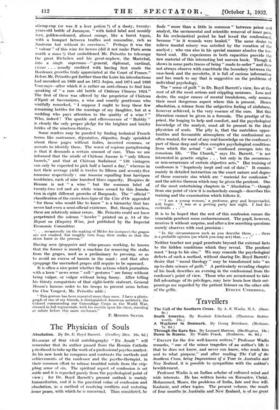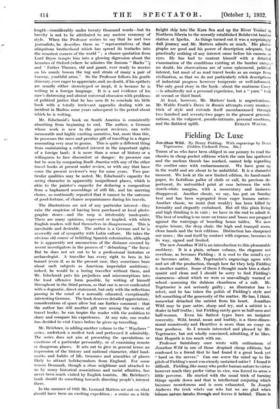Travellers
" ExcErr for the feW well-known 'writers," Professor Wadia remarks, one of the minor tragedies of an author's life is that he does not know, and never can know, who reads hint and to what Purpose,' and after reading The Call of the Southern Cross, being Impressions, of .d Tour in Australia and New Zealand, it is possible to sympathize with the author's bewilderment.
Professor Wadia is an Indian scholar of cultured mind and wide interests. He has written bOoks on ZOroctAter, Christ, Mohammed, Moses, the problems of India, fate and free will, Kashmir, and -other topics. The present volume, the result or four months.in AnStralia and NeiVZetiland, is of no great
length—considerably under twenty thousand words—but its brevity is not to be attributed to any austere economy of style. When the Professor wishes to say that he met two journalists, he describes them as " representatives of that ubiquitous brotherhood which has spread itt tentacles into the remotest corners of the world " ; a chance quotation from Lord Bryce tempts him into a glowing digression about the beauties of Oxford (where he admires the famous " Backs" I) and Father Thames, old and gaunt, ever ready to receive on his manly bosom the tug and strain of many a pair of Lrawny, youthful armi.", So the Professor follows his gentle itinerary, ever eager to appreciate, and, no doubt, if his epithets are usually either stereotyped or inept, it is because he is writing in a foreign language. It is a sad evidence of his race's distressing and almost universal obsession with problems of political justice that he has seen fit to conclude his little book with a totally irrelevant appendix dealing with an incident in Madras some years subsequent to the period about which he is writing.
Mr. Edschmid's book on South America is consistently absorbing from beginning to end. The author, a German whose work is new to the present reviewer, can write memorable and highly exciting narrative, but, more than this, he possesses the rarer and peculiar gift of travelling in a degree amounting very near to genius. This is quite a different thing from maintaining a cultured interest in the important sights of a foreign land; it is more than a sense of history or a willingness to face discomfort or danger; its presence can but be seen by comparing South America with any of the other travel books at present under review, or with any that have come the present reviewer's way for some years. Two par- ticular qualities may be noted, Mr. Edschmid's capacity for seeing character in apparently insignificant places, which is akin to the painter's capacity for deducing a composition from a haphazard assemblage of still life, and his unerring choice, so continually repeated that it cannot be the outcome of good-fortune, of chance acquaintances during his travels.
The illustrations are not of any particular interest—they raise the suspicion of having been purchased at local photo- graphic stores—and the map is intolerably inadequate. There are many opinions, expressed or implied, with which English readers will find themselves in disagreement. This is inevitable and desirable. The author is a German and he'is avowedly out of sympathy with Latin culture. He takes the obvious old course of belittling Spanish colonization, although he is apparently not unconscious of the distance covered by recent investigators in the process of " debunking " the Incas But he does not set out to be a professional historian or archaeologist. A traveller has every right to bees in his bonnet (even if, as in the present case, they sometimes buzz about such subjects as American imperialist ambition) ; indeed, he would be a boring traveller without them, and Mr. Edschmid puts his prejudices and misconceptions into the least offensive form possible, by writing of himself throughout in the third person, so that one is never confronted with a dogmatic, direct statement, but only with the reflections passing in the mind of a normally educated, exceptionally interesting German. The book deserves detailed appreciation ; considerations of space allow but one further comment : that the author has still another gift rare among the writers of travel books ; he can inspire the reader with the ambition to share and compare his experiences. At any rate, one reader has decided to visit Cuzco before he gives up travelling.
Mr. Brochner, in adding another volume to the " Wayfarer " series, undertook a modest task and performed it admirably. The series does not aim at presenting the speculations or emotions of a particular personality, or of examining remote or dangerous places. It sets out to give in general terms an impression of the history and national character, chief land- marks and habits of life, treasures and amenities of places likely to attract holidaymakers from England. For some reason Denmark, though a close neighbour and attached to us by many historical .associations. and racial affinities, • has , never been much visited by English tourists. Mr. BrOchner's book should do something towards directing people's interest there.
In the summer of 1931 Mr. Leonard Matters set out on what should have been an exciting expedition : a- cruise on a little
freight ship into-the Kara Sea and up the River Yenliei in Northern Siberia to the recently established Bolshevist lumber station at Igarka. As things turned out it was a surprisingly
dull journey and Mr. Matters admits Much. His photo- , graphs are good and his power of description adequate, but practically nothing of any interest came before his camera or ekes. He has had to content himself with a detailed examination of the conditions existing at the lumber camp ; )0 no doubt; his observations are ig some ephemeral, political interest, but most of us read travel books as an escape from civilization, so that we do not particularly relish descriptions of industrial progress however temperate or well-informed. The only good story in the book—abant the mutinous Casey
admittedly not a personal experience, but a " yarn " told at second or third hand.
At least, however, Mr. Matters' book is unpretentious. Mr. Waldo Frank's Dawn in Russia attempts every monkey- trick of style and extends itself unembarrassed through two hundred and seventy-two pages in the grossest generali- zations, in the vulgarest, pseudo-intimate, personal emotions,















































 Previous page
Previous page